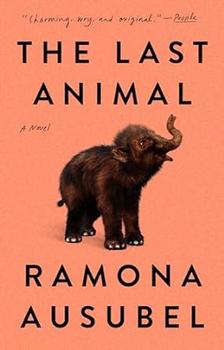Book Club Discussion Questions
In a book club? Subscribe to our Book Club Newsletter!
For supplemental discussion material see our Beyond the Book article, De-extinction Projects: The Example of the Auroch and our BookBrowse Review of The Last Animal.
Please be aware that this discussion guide will contain spoilers!
- The Last Animal tells the story of Jane, a female scientist, and her two teenage daughters, Eve and Vera, who engage in a wild scientific experiment—and end up learning about themselves in the process. What preexisting tensions within the family are brought out by this experiment?
-
Eve and Vera have very different personalities and roles in the family but are extremely close. At one point, Vera thinks, "As the first born, it was [Eve's] job to be the icebreaker ship, plowing through her mother's good intentions. Fifteen was old enough to brew stronger, higher-value anger. Vera's version, at thirteen, was only a mixer." How would you characterize each of them? How much of their personalities, outlooks, and behaviors did you see as being an effect of birth order or past experience? How do their individual personalities shape the story?
- When the novel opens, the girls' father, Sal, has been dead for one year. How do Jane, Eve, and Vera's feelings about Sal's death evolve over the course of the story? Consider how they each find closure around his loss. What do you think the novel is saying about grief and legacy?
- The Last Animal unfolds at a research station in the Arctic, an exotic animal farm in Italy, and a frigid coastal enclave in Iceland. Eve's and Vera's young lives involve constant travel: "They had grown up on the road, on the move, in countries all over the world. They had been brave, or else they had had no choice." What does this nomadic life give to Jane and Sal's daughters, and what does it take away? Consider how the family functions when they are abroad versus when they are home in Berkeley. Which lifestyle do you think is better for them as individuals or as a family?
- Helen and George are benefactors of the mammoth experiment, and their largesse is appreciated by Jane and the girls, as well as viewed with suspicion. What are Helen's and George's deeper motivations, and when did you begin to suspect them? What do Jane and her daughters learn from Helen about trust and sacrifice?
- Jane is the only female scientist on her research team. In what ways does her gender hold her back? Do you think this phenomenon is limited to science? What does it mean that Jane's daughters observe this kind of sexism in action? Do you think Jane would make the same daring choices in response to it all if her daughters weren't in the picture?
- Describe Vera's relationship with Lars. In what ways does this teenage romance point to shifting dynamics between Eve and Vera? Jane's reaction to learning that they are dating causes Vera to do something very unusual with the remnants of her father's research. What do you think she is trying to prove to her mother—and more importantly, to herself?
- For a nonspeaking character, Pearl plays an essential role in this story. What did Pearl make you feel? What did she symbolize for you? What do Eve's and Vera's reactions to Pearl show us about their feelings toward their mother and their status in the family?
- Storytelling is a theme that is threaded throughout the book: Eve and Vera play a game called "Fortunately/Unfortunately," that keeps them connected in unfamiliar settings; Jane tells the girls much-loved tales about their father; Dago tells the story of the Ice Age. What do these different kinds of stories reveal about the characters who tell them? What do they reveal about the importance of storytelling in general?
- Did The Last Animal make you think at all differently about the history or future of the planet?
Unless otherwise stated, this discussion guide is reprinted with the permission of Riverhead Books.
Any page references refer to a USA edition of the book, usually the trade paperback version, and may vary in other editions.
For supplemental discussion material see our Beyond the Book article, De-extinction Projects: The Example of the Auroch and our BookBrowse Review of The Last Animal.
